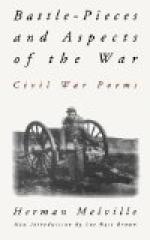4. Some of the cannon of old times, especially the brass ones, unlike the more effective ordnance of the present day, were cast in shapes which Cellini might have designed, were gracefully enchased, generally with the arms of the country. A few of them—field-pieces—captured in our earlier wars, are preserved in arsenals and navy-yards.
5. Whatever just military criticism, favorable or otherwise, has at any time been made upon General McClellan’s campaigns, will stand. But if, during the excitement of the conflict, aught was spread abroad tending the unmerited disparagement of the man, it must necessarily die out, though not perhaps without leaving some traces, which may or may not prove enduring. Some there are whose votes aided in the re-election of Abraham Lincoln, who yet believed, and retain the belief, that General McClellan, to say the least, always proved himself a patriotic and honorable soldier. The feeling which surviving comrades entertain for their late commnder is one which, from its passion, is susceptible of versified representation, and such it receives.
6. At Antietam Stonewall Jackson led one wing of Lee’s army, consequenty sharing that day in whatever may be deemed to have been the fortunes of his superior.
7. Admiral Porter is son of the late Commodore Porter, commander of the Frigate Essex on that Pacific cruise which ended in the desparate fight off Valparaiso with the English frigates Cherub and Phoebe, in the year 1814.
8. Among numerous head-stones or monuments on Cemetery Hill, marred or destroyed by the enemy’s concentrated fire, was one, somewhat conspicuous, of a Federal officer killed before Richmond in 1862.
On the 4th of July 1865, the Gettysburg National Cemetery, on the same height with the original burial-ground, was consecrated, and the corner-stone laid of a commemorative pile.
9. “I dare not write the horrible and inconceivable atrocities committed,” says Froissart, in alluding to the remarkable sedition in France during his time. The like may be hinted of some proceedings of the draft-rioters.
10. Although the month was November, the day was in character an October one—cool, clear, bright, intoxicatingly invigorating; one of those days peculiar to the ripest hours of our American Autumn. This weather must have had much to do with the spontaneous enthusiasm which seized the troops—and enthusiasm aided, doubtless, by glad thoughts of the victory of Look-out Mountain won the day previous, and also by the elation attending the capture, after a fierce struggle, of the long ranges of rifle-pits at the mountain’s base, where orders for the time should have stopped the advance. But there and then it was that the army took the bit between its teeth, and ran away with the generals to the victory commemorated. General Grant, at Culpepper, a few weeks prior to crossing the Rapidan for the Wilderness, expressed to a visitor his impression of the impulse and the spectacle: Said he: “I never saw any thing like it:” language which seems curiously undertoned, considering its application; but from the taciturn Commander it was equivalent to a superlative or hyperbole from the talkative.




